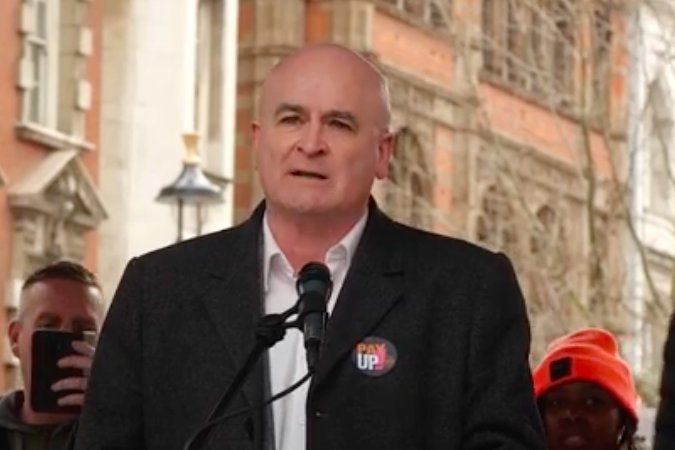'Industrial action will become more entrenched and very bitter'

Mick Lynch has laid out a stark warning on the future of striking in the UK under the Tory government’s new anti-strike legislation.
Lynch said the country faces essentially the ‘conscription of labour’, as new legislation seeking to undermine the ability to take strike action will be voted on in its final stage of Parliament tonight.
Heralded for his straight-talking style, Lynch powerfully described on Times Radio today how the new Strikes Bill would change industrial action for the worst, making it ‘more entrenched’ and ‘very bitter’.
Currently, in order to take strike action, rail unions must give two-week’s notice, name the different job titles going on strike, their locations on the day and how many people will be at each location.
Companies then decide what can run through the strike period using the advice of managers.
But Lynch warned the Strikes Bill presented a ‘very dangerous step’ in a new direction for industrial action on the rails.
The new legislation would require a minimum level of service on strike days, with Lynch arguing that the rail industry requires a large percentage of its staff in order to function properly, which would mean rail workers would be greatly affected by the law.
“What we will have in the future is the conscripting of labour,” Lynch warned.
“They will name people individually to come to work across their picket lines, having taken part in a lawful ballot which is the Tory’s legislation, and then they will be conscripted to come to work. And if they don’t, they can be dismissed.
“So that will get rid of the right to strike. And it won’t be 20 or 30 per cent of the people in our industry, because to run a signalling system or an electrical distribution system or to run trains you have to get a vast amount of staff in, so that will mean there will be no right to strike and we’ll have to come up with other measures.
“Industrial action will become more entrenched, it will become very bitter when people are threatened by the sack.
“People may decide not to come to work anyway, then companies will have to decide whether or not to dismiss them and then, in effect, escalate industrial action by dismissing staff.”
Lynch added that it was a ‘very dangerous step’ and ‘a sign that the people bringing in this legislation don’t really understand it anyway’.
Paul Nowak, general secretary of the TUC also blasted the legislation today as an attempt by Tory backbenchers to ‘drive a wedge between working people’ and to ‘demonise unions’.
Commenting on the reasons for the bill Nowak said: “It’s not about good industrial relations and it’s not really about providing minimum service level, it’s about demonising workers for accessing their fundamental right to take strike action for better pay and conditions.”
Lynch also said they ‘wouldn’t have to worry’ about minimum service levels if the government could just come up with a solution to the current pay disputes.
He labelled the ongoing rail strikes as ‘the most perverse and corrupt you’ve ever seen’, when commenting on the government handsomely bailing out the rail companies with subsidies of £1.5 billion, at the expense of the taxpayer.
Mick Lynch will be speaking tonight at an emergency protest calling for MPs to reject and repeal the Strikes Bill at 6pm outside Downing Street along with other union representatives and MPs.
Hannah Davenport is trade union reporter at Left Foot Forward
Left Foot Forward’s trade union reporting is supported by the Barry Amiel and Norman Melburn Trust

To reach hundreds of thousands of new readers and to make the biggest impact we can in the next general election, we need to grow our donor base substantially.
That's why in 2024, we are seeking to generate 150 additional regular donors to support Left Foot Forward's work.
We still need another 124 people to donate to hit the target. You can help. Donate today.



